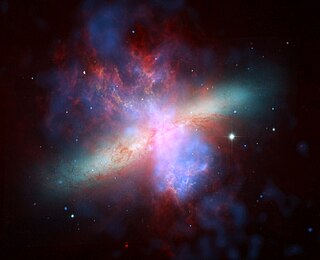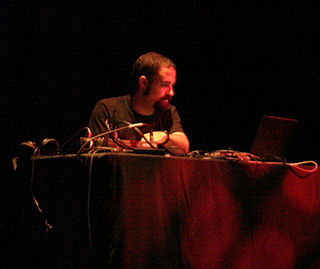Related Research Articles
Electronic music broadly is a group of music genres that employ electronic musical instruments, circuitry-based music technology and software, or general-purpose electronics in its creation. It includes both music made using electronic and electromechanical means. Pure electronic instruments depended entirely on circuitry-based sound generation, for instance using devices such as an electronic oscillator, theremin, or synthesizer. Electromechanical instruments can have mechanical parts such as strings, hammers, and electric elements including magnetic pickups, power amplifiers and loudspeakers. Such electromechanical devices include the telharmonium, Hammond organ, electric piano and electric guitar.
Wendy Carlos is an American musician and composer best known for her electronic music and film scores.

Tangerine Dream is a German electronic music band founded in 1967 by Edgar Froese. The group has seen many personnel changes over the years, with Froese the only constant member until his death in January 2015. The best-known lineup of the group was its mid-1970s trio of Froese, Christopher Franke, and Peter Baumann. In 1979, Johannes Schmoelling replaced Baumann until his own departure in 1985. This lineup was notable for composing many movie soundtracks. Since Froese's death in 2015, the group has been under the leadership of Thorsten Quaeschning. Quaeschning is Froese's chosen successor and is currently the longest-serving band member, having joined in 2005. Quaeschning is currently joined by violinist Hoshiko Yamane who joined in 2011 and Paul Frick who joined in 2020. Prior to this Quaeschning and Yamane performed with Ulrich Schnauss from 2014 to 2020. Schnauss only played two shows with Froese in November 2014 before Froese's passing.

Ambient music is a genre of music that emphasizes tone and atmosphere over traditional musical structure or rhythm. It is often "peaceful" sounding and lacks composition, beat, and/or structured melody. It uses textural layers of sound that can reward both passive and active listening and encourage a sense of calm or contemplation. The genre is said to evoke an "atmospheric", "visual", or "unobtrusive" quality. Nature soundscapes may be included, and the sounds of acoustic instruments such as the piano, strings and flute may be emulated through a synthesizer.
Mario Davidovsky was an Argentine-American composer. Born in Argentina, he emigrated in 1960 to the United States, where he lived for the remainder of his life. He is best known for his series of compositions called Synchronisms, which in live performance incorporate both acoustic instruments and electroacoustic sounds played from a tape.
Elodie Lauten was a French-born American composer described as postminimalist or a microtonalist.

Space music, also called spacemusic or space ambient, is a subgenre of ambient music and is described as "tranquil, hypnotic and moving". It is derived from new-age music and is associated with lounge music, easy listening, and elevator music.
Beaver & Krause were an American musical duo comprising Paul Beaver and Bernie Krause. Their 1967 album The Nonesuch Guide to Electronic Music was a pioneering work in the electronic music genre. The pair were Robert Moog's sales representatives on the U.S. West Coast and were instrumental in popularizing the Moog synthesizer during the late 1960s. As recording artists for Warner Bros. Records in the early 1970s, they released the critically admired albums In a Wild Sanctuary and Gandharva.
Eloy Fernando Fritsch is an electronic musician, keyboard player and main composer of Brazilian progressive rock band Apocalypse. As a solo artist he creates cosmic new-age music.

Murcof is the performing and recording name of Mexican electronic musician Fernando Corona. Corona was born in 1970 in Tijuana, Mexico and raised in Ensenada. He was for a time a member of the Tijuana-based Nortec Collective of electronic musicians under the Terrestre project name. In 2000, he returned to Tijuana. Since 2006, Corona has been living in Barcelona, Spain.

Tod Machover, is a composer and an innovator in the application of technology in music. He is the son of Wilma Machover, a pianist and Carl Machover, a computer scientist.
Angel Tears is a fusion musical duo based in Tel Aviv, Israel, composed of Sebastian Taylor, aka Shakta, and Momi Ochion.

Constance Mary Demby was an American musician, composer, painter, sculptor, and multimedia producer. Her music included new age, ambient, and space music styles. She is best known for her 1986 album Novus Magnificat and her two experimental musical instruments, the sonic steel space bass and the whale sail.
Michael Stearns is an American musician and composer of ambient music. He is also known as a film composer, sound designer and soundtrack producer for large format films, theatrical films, documentaries, commercials, and themed attractions.
Kevin Braheny Fortune is an American musician and composer of ambient music, producer, engineer, and session musician.
David B. Doty is an American composer and authority on just intonation. He is the author of The Just Intonation Primer.
Biomusic is a form of experimental music which deals with sounds created or performed by non-humans. The definition is also sometimes extended to include sounds made by humans in a directly biological way. For instance, music that is created by the brain waves of the composer can also be called biomusic as can music created by the human body without the use of tools or instruments that are not part of the body.

Novus Magnificat: Through the Stargate is the fourth studio album by American musician and composer Constance Demby, with additional contributions by Michael Stearns. It was co-produced by Demby and Anna Turner and released in 1986 on Hearts of Space Records. In its original form, the album features a single 54-minute piece divided into two parts.

Casualties of Cool is the debut album of Canadian country rock duo Casualties of Cool, consisting of Canadian musicians Devin Townsend and Ché Aimee Dorval, released on May 14, 2014. It is a musical departure from any of Townsend's previous works, primarily because it is a concept album that features country-influenced songs with blues rock and ambient influences.
References
- ↑ "Emerald Web | Biography & History". AllMusic. Retrieved 2019-01-29.
- 1 2 3 4 5 6 "INTERVIEW: Emerald Web's 'Valley Of The Birds': A new age classic returns". Ambient Music Guide. Retrieved 2022-05-17.
- ↑ Das, Ramana (December 1983). "Music: The Holiday Spirit". Yoga Journal. p. 48.
- ↑ "15 Mar 1990, Page 21 - News-Press at Newspapers.com". Newspapers.com. Retrieved 2019-01-29.
- ↑ "Emerald Web". Discogs. Retrieved 2019-01-29.